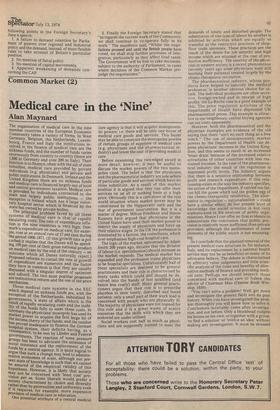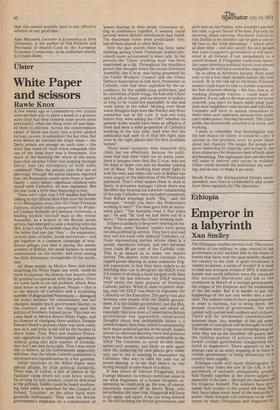Common Market (2)
Medical care in the 'Nine'
Alan Maynard
The organisation of medical care in the nine member countries of the European Economic Community takes a variety of forms. In West Germany, Belgium, the Netherlands, Luxembourg, France and Italy the institutions involved in the finance of medical care are the sickness funds, and the number of funds varies enormously from country to country (there are 1,800 in Germany an,t1 over 200 in Italy). Their function is to finance, often with the aid of state subsidies, medical care provided by private individuals (e.g. physicians) and private and Public institutions. In Denmark, Ireland and the United Kingdom there are no sickness funds and medical care is financed largely out of local and central government taxation. Medical care is provided by individuals contracted to the state and largely public institutions the exception is Ireland which has a large voluntary hospital sector which is financed by the state but owned by private bodies. The principal problem faced' by all these systems of medical care is that of rapidly escalating costs. The rate of expenditure inflation in the nine countries is very high. Denmark's expenditure on medical care, for example, rose at an annual rate of 17 per cent during the period 1966-1971. (If this growth rate is pot curbed it implies that the Danes will be spending 100 per cent of their gross national product on medical care by the end of the century an outcome which all Danes naturally reject.) Proposed reforms to curtail the rate of growth of expenditure are numerous and the factor they have in common is that they are usually discussed with a singular degree of optimism and naivete. The two most popular proposals are institutional reform and the use of the price mechanism.
Those medical care systems in the EEC which depend on sickness funds are, with the exception of the Netherlands, subsidised by governments, -a state of affairs which is the result of rapidly escalating costs and the inability of the funds fully to meet these costs. In Germany the physicians' monopoly has used its market power to acquire the first large bit of the income cherry of the funds; and the residue has proved inadequate to finance the German hospital system, their deficits having, as a consequence, to be met by Lander and Federal governments. The reaction of some pressure groups has been to advocate the extension of social insurance and the replacement of the funds by a central agency. It is quite logical to argue that Such a change may lead to administrative economies of scale, although our present state of knowledge is such that we cannot be assured of the empirical validity of this hypothesis. However, it is likely that society may not be concerned with 'least cost' provision per se. Some liberals would prefer a society characterised by choice and diversity rather than by paternalism and uniformity even if it requires, for example, more expensive provision of medical care or education.
One potential attribute of a central medical care agency is that it will acquire monopsonistic powers: i.e. there will be only one buyer of medical care goods and services. This buyer may be able to constrain the monopolist powers of certain groups of suppliers of medical care (e.g. physicians and the pharmaceutical industry) and lower the cost of providing medical care.
Before examining this two-edged sword in more detail, however, it may be useful to discuss the market powers of the two monopolies cited. The belief is that the physicians and the pharmaceutical industry are sole sellers of particular goods and services which have no close substitute. As a result of this market position it is argued that they can offer their services on an all or nothing basis at a high price. Obviously this is a caricature of the real world situation where market power may be constrained by the Hippocratic oath and the fear of government intervention. But it is a matter of degree. Milton Friedman and Simon Kusnets have argued that physicians in the United States have used their market power to restrict the supply of physicians and force up their relative wages. In the UK the profession is dominated by a faction, the consultants, which over-emphasises high-cost hospital care. The logic of the market, epitomised by Adam Smith 200 years ago, dictates that the division of labour (i.e. specialisation) should increase as the market expands. The medical market has expanded and the profession trains physicians to be hospital specialists. Unfortunately half of these specialists are destined to be general practitioners and their role is characterised by many tasks which could and should be devolved into the hands of less qualified (and hence less costly) staff. Many general practitioners argue that their role is to prescribe placebos to their lonely, disturbed and bored patients: only a small part of their work load is concerned with people who are physically ill. The majority of physicians were not trained for this role and it is a great waste of scarce resources that the skills with which they are endowed are under-utilised. Social workers cost half as much as physicians and are supposedly trained to meet the demands of lonely and disturbed people. The substitution of one type of labour by another is inhibited by activities which are equally as wasteful as the restrictive practices of shopfloor trade unionists. These practices are the result of the desire for job security and high income which are attained at the cost of pro ductive inefficiency. The sanctity of the physician in western society is a recent phenomenon (seventy years ago some physicians were still leeching their patients) created largely by the chemo-therapeutic revolution. The pharmaceutical industry, whose products have helped to sanctify the medical profession, is another obvious choice for attack. The individual producers are often secretive, foreign-owned and in receipt of high profits: the La Roche case is a good example of this. The price regulation activities of the Department of Health have depressed UK pharmaceutical prices. This example is attractive to our neighbours: central buying agencies can cut costs apparently.
However, both the pharmaceutical and the physician examples are evidence of the old saying that there "ain't no such thing as a free lunch." The use of monopsonistic market powers by the Department of Health can depress physicians' incomes in the United Kingdom, and this seems to result in an increased 'brain drain' because of the increased relative attractions of other countries with less restrained incomes. In the case of the pharmaceutical industry the result of the regulation is depressed profit levels. The industry argues that there is a sensitive relationship between profit and research expenditure. If this relationship exists in the way the industry specifies, the action of the Department, if carried too far, can kill the goose which laid the golden egg of the chemo-therapeutic revolution. The alternative to regulation nationalisation could have a similar effect. At our present level of knowledge the social scientist is not very sophisticated in his analysis of public organisations. Hence I can offer no firm evidence to substantiate the conclusion that public provision is relatively more inefficient than private provision, although the performance of some elements of the public sector is not encouraging.
So I conclude that the planned removal of the present medical care structure in, for instance, Italy, and its replacement by a national health service may not be as beneficial as many of its advocates believe. The debate is characterised by arbitrary value judgements and little scientific analysis of the costs and benefits of alternative methods of finance and providing medical care. Per`naps we should beseech those concerned with medical care to follow the advice of Chairman Mao (Oppose Book Worship, 1930): "You can't solve a problem? Well, get down and investigate the present facts and its past history. When you have investigated the problem thoroughly you will know how to solve it. . Conclusions invariably come after investigation, and not before. Only a blockhead cudgels his brains on his own, or together with a group, to find a solution' or 'evolve an idea' without making any investigation. It must be stressed that this cannot possibly lead to any effective solution or any good idea."
Alan Maynard, Lecturer in Economics at York University, is the author of The Finance and Provision of Health Care in the European Economic Community, to be published shortly by Croom-Helm



































 Previous page
Previous page